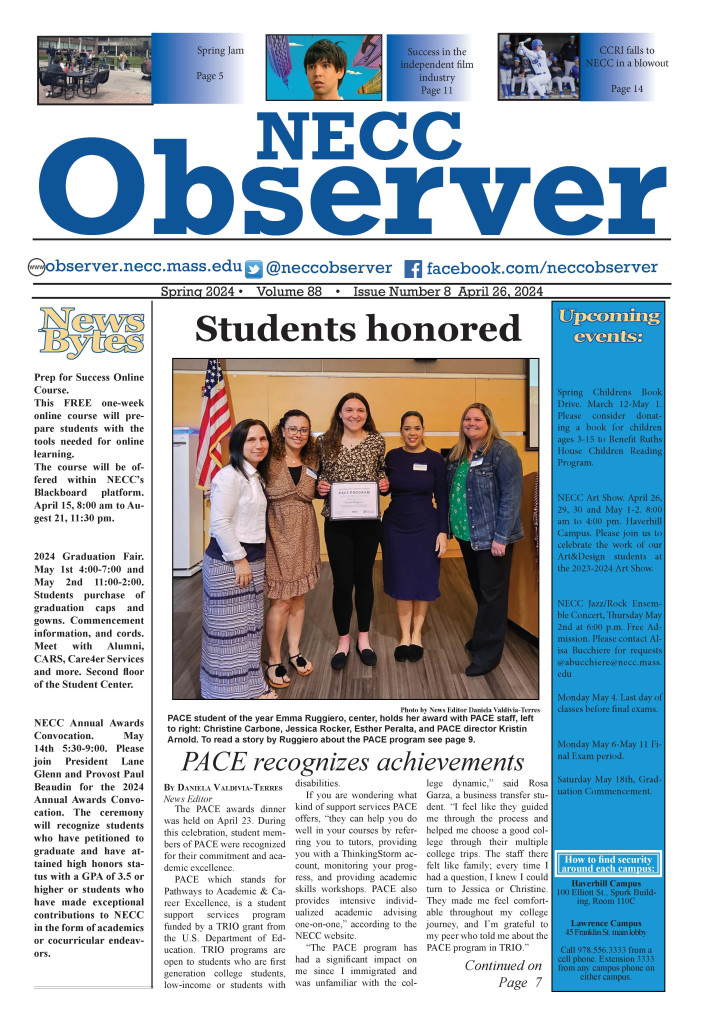Imagine walking up the stairs to the second floor of the Student Center to go to the bookstore, wondering just how much your educational success is going to cost you today. Your line of sight hasn’t even come in line with the top of the stairs yet when, suddenly, a wave of focus-penetrating howling and laughter shatters your train of thought, which is effectively replaced by other-worldly jargon: “I’m telling you, Duck Hunt Dog is top tier!” “Naruto should’ve ended up with Sakura instead of Hinata.” “I special summon my Cyber Soldier from the graveyard in face-down defense mode!”
You look to the area across from the bookstore and see a gaggle of often peculiarly dressed young women and men chatting away merrily, and possibly eating pizza or ramen, playing card games or reading comics or Japanese manga on the school computers.
No, you have not stumbled into enemy territory, although many may try to avoid wandering into their space as if it was. You have merely come into contact with one of NECC’s most diverse groups—one that means nobody any harm, but instead is very prone to welcoming others without question.
“I guess you can call us Team Meme Supreme,” laughed Liam Lavoie, who is a psychology major at NECC and a member of the close-knit group of friends that frequent the area across from the bookstore. A young man seated nearby playfully shouted, “Let’s make a banner!”
Lavoie continued. “Sometimes we play Super Smash Bros. (for 3DS), cards, Pokémon,” he said, pausing; and then, with an accusatory head nod and glare toward the young man seated beside him, he playfully said, “or making (Dungeons and Dragons) characters.” They laughed.
Each individual that frequently hangs out in the area had different motives and stories concerning how they ended up there, but they all continued going for one reason: friendship.
“My friends were hanging out here, so I came,” said Lavoie, who then stated that he first began hanging out there because it was once a hotspot for casual lunch conversations, and thus bonding with like-minded individuals.
Many students may not know—especially newer students—that the NECC bookstore space was once a cafeteria, and all of the current seating outside of the bookstore was once just a simple eating area for students. Many lasting ties were forged during typical lunch periods between students with similar interests, to include things like the anime and gaming cultures. Those earlier times have essentially allowed for Team Meme Supreme to thrive as well as it has.
“The thing I like about this group is that it’s so big,” said Conor Miller, who is a theater major at NECC and the hand and voice behind the blue Bad Idea Bear (which he affectionately named BB King) from the Top Notch Players’ production, Avenue Q. “We never turn anyone away,” he followed.
The size of the groups that stay in the area across from the bookstore varies greatly, and typically depends on the time and the day of the week one happens to pass by; however, regardless of their size, their presence seldom goes unnoticed.
“We’re the most diverse group on campus,” he said, and then went on to joke about how their numbers would easily trump that of any actual club or organization at NECC. Miller then went on to ponder on how he became a member of Team Meme Supreme.
“I was playing Pokémon Crystal, sitting all by myself next to a large group of people playing video games, when a guy named Mike came up and said, ‘Is that Pokémon Crystal? You should come show us!’” said Miller reminiscently. Miller has since maintained and created bonds with others with interests similar to his.
A major point of speculation from passersby is the amount of time members of Team Meme Supreme spend in their hangout spot. Some individuals have gone as far as to joke that many of those who frequent their spot aren’t even students at NECC because of the lengths of time some of them remain there.
Lavoie stated that he spends around two to two-and-a half hours per day, or about eleven hours per week just hanging out with friends in their hangout spot. Benigno “Benny” Agosto, a psychology major at NECC, who was wearing a black fedora, quickly chimed in by excitedly stating, “I think I spend double that!”
Agosto remarked on how someone had introduced him to the group on his first day at NECC.
“I kind of just wandered in and stayed,” he quipped. “The vibe was awesome, so I kept coming!”
None of the members of Team Meme Supreme seemed very concerned with what others may think of them, to include NECC’s public safety officers, who playfully refer to them as “the loud group.” More than anything, each individual from their informal organization would like their fellow students, faculty and staff, and even the security guards to know that they mean nobody any harm. Instead, they encourage others to join them or engage them in conversation whenever they’d like.
“We’re not as scary as you think,” said Agosto. “We may be loud and we may seem crazy, but we’re really cool. Walk in and we love you!” he said lastly.
As Agosto finished speaking, another affiliate of Team Meme Supreme sat down beside Agosto with a My Little Pony plush doll stuffed in through the neck of his shirt with only its head sticking out.
“It’s for intimidation purposes,” he said with a wry smile, perfectly embracing the joyfully benign spirit of Team Meme Supreme.
Regardless of one’s personal feelings toward Team Meme Supreme, the fact of the matter is that they fully intend to continue hanging out and enjoying one another’s company.
However, if one ever feels like having a joyful conversation about anything, they’d like others to know one thing: “The more the merrier!”

